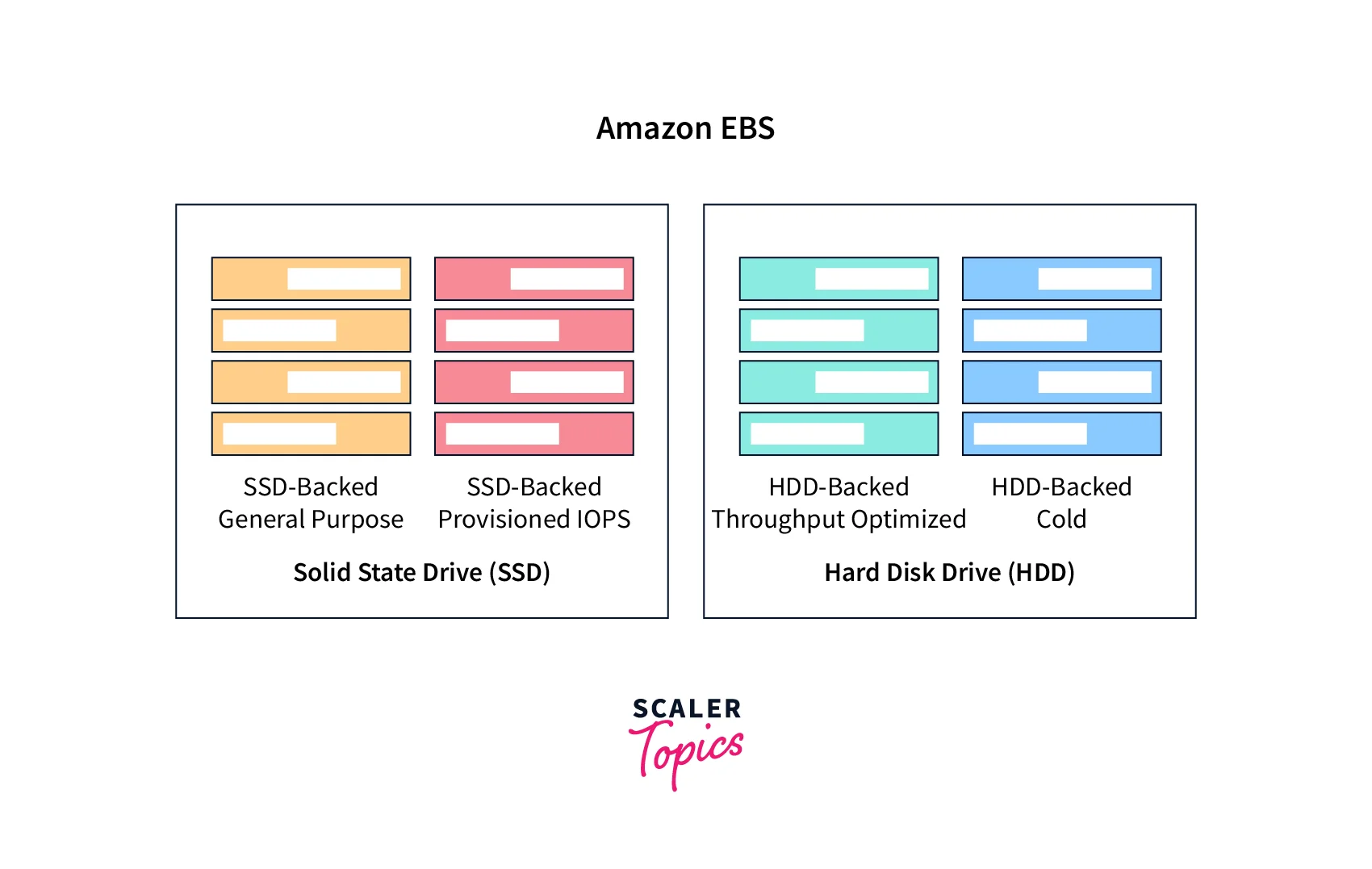EBS Volume Types
Amazon Web Services offers diverse Elastic Block Store (EBS) volume types, catering to varied storage and performance needs. These are broadly categorized into SSD volumes, ideal for transactional workloads like databases, and HDD volumes, suited for throughput-intensive tasks like MapReduce. SSD options include General Purpose SSD, Provisioned IOPS SSD for demanding applications, and HDD choices featuring Throughput Optimized and Cold HDD for different access levels. Understanding the specific use cases and performance characteristics of each EBS volume type, from high IOPS SSDs to cost-effective HDDs, is key for optimal AWS storage solutions.

Solid State Drives (SSD)
Solid State Drives are usually preferred in cases where high Input Output per Second (IOPS) is required during a random or sequential I/O operation and are well suited for transactional workloads where the key performance attribute is IOPS.
SSDs in AWS EBS volume types are further classified into General Purpose SSD volumes and Provisioned IOPS SSD volumes.
General Purpose SSD volumes
General purpose SSD volumes provide a high-performance SSD volume at a comparably lower price, hence providing a balance between cost and performance, and are well suited for most workloads, including boot volumes, medium-sized databases, development environments, virtual desktops, etc.
General Purpose SSD volumes in EBS volume types are divided into:
- gp2: The default EBS volume type for EC2 instances is gp2 volumes, and are highly recommended as boot volumes for EC2 instances. A gp2 volume can range in size from 1 GiB to 16 TiB, while the performance of a gp2 volume scales linearly with its size, larger gp2 volumes have higher baseline performance levels. The below table lists the key performance metrics of a gp2 volume:
| Description | gp2 volumes |
|---|---|
| Volume Size | 1 GiB–16 TiB |
| Minimum/maximum IOPS at 16 KiB I/O | 100–16,000 |
| Maximum throughput per volume | 250 MB/s |
| Boot volume | Supported |
| Multi-attached volumes | Not supported |
| Latency | single digit millisecond |
| Price | $0.10/GB-month |
- gp3: The most recent generation of SSD general purpose volumes are referred to as gp3 volumes. At a cheaper cost than gp2, the gp3 volumes provide a constant baseline of 3000 IOPS and 125MB/s throughput regardless of the storage size and additional performance can be provisioned for an additional fee.
The below table lists the key performance metrics of a gp3 volume:
| Description | gp3 volumes |
|---|---|
| Volume Size | 1 GiB–16 TiB |
| Minimum/maximum IOPS at 16 KiB I/O | 3,000–16,000 |
| Maximum throughput per volume | 1,000 MB/s |
| Boot volume | Supported |
| Multi-attached volumes | Not supported |
| Latency | single digit millisecond |
| Price | $0.08/GB-month |
Provisioned IOPS SSD volumes
Provisioned IOPS SSD volumes are the high-performance SSD volumes used for IOPS and throughput-intensive workloads. The current offering includes io1, io2 and io2 Block Express in EBS volume types.
The below table lists the key performance metrics of io1, io2, and io2 Block Express volumes:
| Description | io1 | io2 | io2 Block Express |
|---|---|---|---|
| Volume size | 4 GiB–16 TiB | 4 GiB–16 TiB | 4 GiB – 64 TiB |
| Minimum/maximum IOPS at 16 KiB I/O | 100–64,000 | 100–64,000 | 100-256,000 |
| Maximum throughput per volume | 1000 MB/s | 1000 MB/s | 4,000 MB/s |
| Boot volume | Supported | Supported | Supported |
| Multi-attached volumes | Supported | Supported | Supported |
| Latency | single digit millisecond | single digit millisecond | sub-millisecond |
| Price | $0.125/GB-month | $0.125/GB-month | $0.125/GB-month |
For each of the three IOPS SSD EBS volume types, a different amount is paid based on the provisioned IOPS per month.
Note: io2 Block Express volumes are supported with C7g, R5b, X2idn, and X2iedn instances only.
Hard Disk Drives (HDD)
Hard Disk Drives are usually preferred in cases where high Throughput is required during a large and sequential I/O operation such as reading video files, logs processing, etc. HDDs are cheaper compared to SSDs and ideal for tasks that require high throughput.

HDDs in AWS EBS are further classified into st1 Throughput Optimized HDD volumes and sc1 Cold HDD volumes.
-
st1 Throughput Optimized HDD: st1 volumes provide high throughput for accessing large and sequential data and support frequently accessed storage requirements. Throughput rather than IOPS is the primary performance metric in st1.
-
sc1 Cold HDD: sc1 volumes are the lowest cost volume type and are recommended for less frequent storage access requirements. Throughput rather than IOPS is the primary performance metric in sc1 as well.
The below table lists the key performance metrics of st1 and sc1:
| Description | st1 | sc1 |
|---|---|---|
| Volume size | 125 GiB–16 TiB | 125 GiB–16 TiB |
| Minimum/maximum throughput at 1 MB I/O | 5–500 MB/s | 2–192 MB/s |
| Maximum burst throughput per volume | 500 MB/s | 250 MB/s |
| Boot volume | Not supported | Not supported |
| Multi-attached volumes | Not supported | Not supported |
| Price | $0.045/GB-month | $0.015/GB-month |
Previous Generation Magnetic Volumes
It is advised to utilize gp2 or gp3 for workloads on AWS, while AWS Magnetic volumes, an earlier generation volume, are still available on the AWS dashboard. Magnetic volumes in EBS volume types offer a volume size of 1Gib-1TiB and maximum IOPS of 40–200. It can be used for infrequently accessed data.
Conclusion
- In this article, we learned about different EBS volume types available on AWS and the characteristics of each.
- We also looked at the most important performance indicators for each volume type that may use to choose a volume.
- We also considered the price variations between various volume types.

